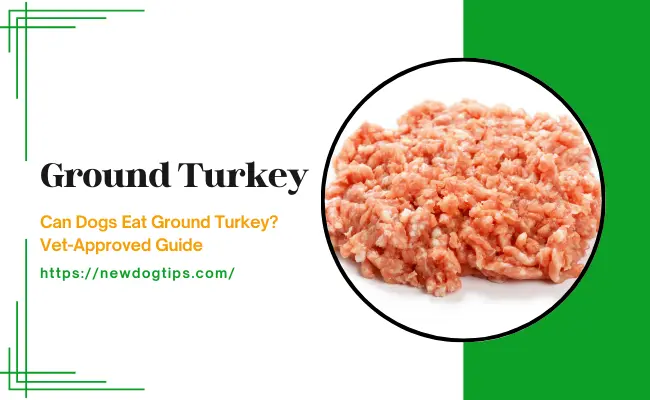
Can dogs eat ground turkey? If you’ve ever cooked up some turkey and caught your dog watching you with those big, hopeful eyes, you’ve probably wondered about this. Many pet owners are curious, especially if they like making homemade meals, have a dog with a sensitive stomach, or are dealing with food allergies.
The quick answer is yes-dogs can eat ground turkey, but only if it’s cooked well and served plain. That means no seasonings, extra fat, or bones. Plain, cooked turkey can be a healthy treat or meal topper for your furry friend.
So, why do people want to feed ground turkey to their dogs? It’s easy to cook, gentle on the tummy, and mixes well with rice or veggies. Plus, it’s a good option for dogs who can’t eat chicken or beef.
In this article, we’ll walk you through everything you need to know about giving ground turkey to your dog. We’ll talk about the health benefits, the risks, how to prepare it safely, and even which dogs might benefit most. You’ll also get answers to common questions and some ideas for other healthy proteins if turkey isn’t the right fit. Let’s get started!
Is Ground Turkey Safe for Dogs?
If you’re wondering, “is ground turkey safe for dogs?” the good news is yes-plain, cooked ground turkey is safe for most dogs and can be a healthy addition to their diet. Turkey is a lean protein that helps build strong muscles and gives your dog energy. Many commercial dog foods use turkey for these reasons.
But there are some important things to remember. Dogs should only eat ground turkey that is fully cooked and served plain. Do not add any seasonings, salt, garlic, onions, butter, or extra fat. These ingredients can upset your dog’s stomach or even be toxic. For example, garlic and onions can damage your dog’s red blood cells and cause serious health problems. Too much fat or skin can also lead to stomach upset or a painful condition called pancreatitis.
Bones are another big danger. Never give your dog turkey bones-cooked or raw. Bones can splinter and cause choking, mouth injuries, or blockages in your dog’s digestive system, which may need emergency surgery.
It’s also important to avoid feeding dogs raw ground turkey. Raw turkey can carry harmful bacteria like salmonella or E. coli, which can make your dog sick and even spread to people in your home. Always cook ground turkey to a safe temperature before serving it.
In summary:
- Plain, cooked ground turkey is safe for dogs and is a good source of lean protein.
- Never add seasonings, fat, skin, or bones.
- Do not feed raw turkey to your dog because of the risk of bacteria.
- Always serve turkey in small amounts as a treat or meal topper, not as a full meal.
If you’re ever unsure or your dog has special health needs, talk to your vet before adding new foods to their diet. This way, you can keep your furry friend happy and healthy!
Nutritional Benefits of Ground Turkey for Dogs

Ground turkey is a fantastic choice if you want to feed your dog something healthy and tasty. It’s packed with lean protein, which helps your dog build strong muscles and have plenty of energy for playtime and walks. Because turkey is low in fat, it’s also a good option for dogs who need to watch their weight.
But that’s not all-ground turkey is full of important vitamins and minerals. It has B vitamins like B6 and niacin, which help your dog’s body turn food into energy and keep their metabolism running smoothly. Turkey also has zinc, which is great for your dog’s skin and immune system, and phosphorus, which keeps their bones and teeth strong.
One of the best things about turkey is that it’s gentle on your dog’s stomach. If your pup has a sensitive tummy or has had trouble with other meats, turkey is usually easier to digest. Plus, some dogs are allergic to common proteins like chicken or beef. Turkey is less likely to cause problems, so it’s a good choice for dogs with food allergies or itchy skin.
How does turkey compare to other meats? Chicken is also a lean protein, but some dogs are allergic to it. Beef has more fat, which isn’t always the best for dogs who need to stay slim. Turkey is often a “new” protein for dogs, so it’s less likely to cause allergic reactions.
To sum it up:
- Turkey is lean and packed with protein for strong muscles
- It’s full of B vitamins, zinc, and phosphorus for overall health
- It’s gentle on sensitive stomachs and great for dogs with allergies
- It’s lower in fat than beef and less likely to cause problems than chicken for some dogs
If you’re looking for a healthy, simple protein to add to your dog’s meals, ground turkey is a great pick. Just remember to cook it plain and skip the seasonings, and your pup will thank you with happy tail wags!
Risks and Precautions
When feeding your dog ground turkey, it’s important to know about the risks and take some simple precautions. Here’s what every dog owner should keep in mind:
Can Dogs Eat Raw Ground Turkey?
Raw ground turkey is not safe for dogs. Raw turkey can carry harmful bacteria like salmonella and E. coli. If your dog eats raw turkey, they might get very sick. Symptoms can include vomiting, diarrhea, fever, loss of appetite, and low energy. Puppies, older dogs, and dogs with weak immune systems are at even higher risk. Cooking turkey all the way through kills these dangerous germs and keeps your dog safe.
Turkey Bones Danger
Turkey bones are very dangerous for dogs, whether they are cooked or raw. When dogs chew on bones, the bones can break into sharp pieces. These sharp bits can cause choking, block your dog’s throat or intestines, or even poke holes in their stomach or gut. Sometimes, bone splinters can cause serious injuries that need emergency surgery. Bones can also break your dog’s teeth or carry bacteria that make your dog sick. It’s best to never give your dog turkey bones, no matter how much they beg.
High-Fat Parts: Skin and Dark Meat
Turkey skin and dark meat have a lot of fat. Too much fat can be hard for dogs to digest and can lead to a painful illness called pancreatitis. Signs of pancreatitis include vomiting, diarrhea, belly pain, and tiredness. If you notice any of these symptoms after your dog eats fatty foods, call your vet right away.
Seasonings, Garlic, Onions, and Salt
Never feed your dog turkey that has been cooked with seasonings, garlic, onions, or extra salt. Garlic and onions are toxic to dogs and can damage their red blood cells, leading to serious health problems like anemia. Even small amounts can be dangerous. Too much salt or spices can also upset your dog’s stomach or cause other health issues.
Final Tips
To keep your dog safe, always serve ground turkey plain and fully cooked. Skip the bones, skin, fat, and seasonings. If you ever have questions or your dog has special health needs, talk to your vet before adding new foods to their diet. This way, you can share a tasty treat while keeping your furry friend healthy and happy.
How to Safely Prepare Ground Turkey for Dogs
If you want to give your dog ground turkey, it’s important to prepare it the right way. Cooking it plain and simple helps keep your dog healthy and happy. Let’s go through the steps together.
How to Cook Ground Turkey for Dogs
Boiling Method:
- Place the ground turkey in a large pot.
- Cover the meat with water.
- Bring the water to a boil.
- Lower the heat and let it simmer for about 5-10 minutes, or until the turkey is fully cooked and no longer pink.
- Drain the water and let the turkey cool before serving.
Baking Method:
- Preheat your oven to 350°F (175°C).
- Spread the ground turkey evenly in a baking dish.
- Bake for about 20-25 minutes, or until the turkey is cooked through and no longer pink.
- Let it cool before serving it to your dog.
Important Tips:
- Do not add any spices, salt, garlic, onions, oil, or butter. These can be harmful to your dog.
- Always use lean ground turkey for the healthiest option.
Serving Size Guidelines
Ground turkey should be a treat or a meal topper, not your dog’s entire diet. A good rule is to give about 1–2 tablespoons of cooked ground turkey per 10 pounds of your dog’s body weight. If you want to use turkey as a main protein in homemade food, talk to your vet to make sure your dog gets all the nutrients they need.
Simple Ground Turkey Dog Food Recipe
Here’s an easy recipe you can try at home:
Ingredients:
- 1 pound ground turkey
- 1 cup cooked brown rice or quinoa
- ½ cup chopped carrots or green beans (or both)
- 1 tablespoon olive oil (optional, for cooking)
Instructions:
- In a large skillet, heat the olive oil over medium heat (if using).
- Add the ground turkey and cook until browned, breaking it up into small pieces.
- Add the chopped vegetables and cook for another 5 minutes, stirring now and then.
- Mix in the cooked rice or quinoa.
- Let the mixture cool to room temperature before serving it to your dog.
This recipe is gentle on your dog’s stomach and gives them a mix of protein, fiber, and vitamins. Store leftovers in the fridge for up to three days.
Final Tips
- Always serve ground turkey plain and fully cooked.
- Avoid bones, skin, and any seasonings.
- Start with small amounts and see how your dog reacts.
- For big changes in your dog’s diet, check with your vet first.
By following these simple steps, you can safely add ground turkey to your dog’s meals and keep their tail wagging!
Breed-Specific Considerations
When it comes to feeding ground turkey to your dog, it’s helpful to think about your dog’s breed and size. Different breeds and ages have their own needs, so let’s look at how ground turkey can fit into their diets.
Best Protein for Large Breeds
Big dogs like Labradors and German Shepherds need plenty of lean protein to stay strong and healthy. Ground turkey is a great choice for them because it’s high in protein but low in fat. This helps large breeds build and maintain muscle without gaining extra weight. Lean meats like turkey are also easier on their stomachs, which is important for active dogs who sometimes have sensitive digestion.
Small Dogs and Turkey
Small dogs, such as French Bulldogs or Chihuahuas, can also enjoy ground turkey, but you need to be careful with how you serve it. Always shred or chop the turkey into tiny pieces so it’s easy for them to chew and swallow. This helps prevent choking, which can be a risk for little dogs with small mouths and throats. Start with small amounts and see how your pup likes it.
Turkey for Senior Dogs
Older dogs often have more sensitive stomachs and may not digest food as easily as they used to. Ground turkey is soft, easy to chew, and simple to digest, making it a good protein source for senior pets. It’s gentle on aging tummies and can help keep older dogs interested in their meals, especially if they’ve lost some appetite.
Final Thoughts
No matter your dog’s breed or age, always serve ground turkey plain and cooked. Avoid adding bones, skin, or seasonings. If you’re not sure how much turkey to give or want to make it a regular part of your dog’s diet, talk to your vet. Every dog is different, and your vet can help you choose the best protein and serving size for your furry friend.
Alternatives to Ground Turkey
If your dog can’t eat ground turkey, or you just want to change things up, there are plenty of healthy dog food proteins to choose from. Let’s look at some great options that are safe, tasty, and good for your pup.
Lean Chicken
Chicken is a popular choice for many dogs. Like turkey, chicken is high in protein and low in fat, making it a healthy option for most dogs. It’s easy to digest and supports strong muscles. Most dogs aren’t allergic to chicken, so it’s a good pick if your dog can’t have turkey. However, some dogs can develop chicken allergies over time, so watch for any signs of itching or tummy trouble if you’re trying chicken for the first time.
Fish (Like Salmon)
Fish, especially salmon, is another excellent protein for dogs. Salmon is rich in omega-3 fatty acids, which help keep your dog’s skin healthy and coat shiny. Fish is also easy to digest and is a smart choice for dogs with allergies to chicken or beef. Many vets recommend adding fish to your dog’s meals a couple of times a week for variety and extra nutrition.
Plant-Based Proteins
Some dogs have allergies to several meats. In this case, plant-based proteins can be a good solution. Foods like lentils, chickpeas, peas, and quinoa are packed with protein and other important nutrients. Plant-based proteins are best when you blend a few types together. This way, your dog gets all the amino acids and vitamins they need for good health.
Turkey vs. Chicken for Dogs
Both turkey and chicken are lean, white meats that are easy for dogs to digest. They both support muscle health and are low in fat and calories. Turkey is sometimes a better choice for dogs with chicken allergies or sensitivities, but both are great options if your dog enjoys them and digests them well.
Commercial Dog Foods with Turkey
If you want to feed your dog turkey but don’t want to cook it yourself, many commercial dog foods use turkey as the main ingredient. These foods are made to be balanced and complete, so your dog gets all the nutrients they need. Look for brands that use real turkey and avoid fillers or artificial flavors. Turkey-based dog foods are often made for dogs with sensitive stomachs or allergies to other meats, and they come in both dry and wet varieties.
Conclusion
Plain, cooked ground turkey is safe for most dogs when given in moderation. It’s a lean protein that can help build strong muscles and keep your dog full of energy. Make sure the turkey is always cooked well, served plain, and free from bones, skin, fat, or any seasonings.
Ground turkey is often used in commercial dog foods and can be a good option for dogs with sensitive stomachs or allergies. However, it should only be a small part of your dog’s overall diet, not the main meal every day.
Before making any big changes to your dog’s diet, it’s important to talk to your vet. This is especially true if your dog has health problems, food allergies, or a sensitive stomach. Your vet can help you decide how much ground turkey is right for your dog and make sure their meals stay balanced and healthy.
In short, plain, cooked ground turkey can be a tasty and healthy treat for your dog. Just remember to keep it simple, serve it in small amounts, and always check with your vet if you have any questions about your dog’s food. This way, you’ll help your furry friend stay happy, safe, and healthy.
FAQs.
Can Dogs Eat Ground Turkey?
Yes, dogs can eat ground turkey if it is cooked plain with no spices, salt, or fat. It is a healthy, lean protein for most dogs when served in small amounts.
Can a Dog Eat Ground Turkey?
Yes, a dog can eat ground turkey as long as it is cooked thoroughly and served plain. Avoid adding any seasonings, skin, bones, or extra fat.
Can Dogs Eat Raw Ground Turkey?
No, dogs should not eat raw ground turkey. Raw turkey can have harmful bacteria like salmonella, which can make your dog sick. Always cook it well before serving.
Can Dogs Eat Cooked Ground Turkey?
Yes, dogs can eat cooked ground turkey. Make sure it is plain, with no added spices, salt, or fat. Cooked ground turkey is safe and healthy for most dogs.
Can Dogs Eat Lean Ground Turkey?
Yes, dogs can eat lean ground turkey. It is a good source of protein and is low in fat. Always cook it plain and serve in small portions as a treat or meal topper.
Can My Dog Eat Ground Turkey Every Day?
It’s best not to feed your dog ground turkey every day. Use it as a treat or meal topper, not the main food. Always check with your vet before making it a daily part of your dog’s diet.



